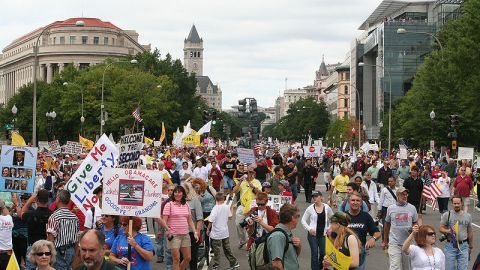What the Tea Party Doesn’t Know

Tea Party supporters don’t know what they’re talking about. That’s what Bruce Bartlett argues in his latest Forbes column. He and David Frum—both Bartlett and Frum worked in the Bush administration—organized a survey of protesters at a recent Tea Party demonstration on Capitol Hill. And they found that “for an anti-tax group, they don’t know much about taxes.”
Tea Party protesters believed on average that federal taxes were around 40% of the GDP. But in fact federal taxes—including the payroll and social security tax—are less than 15% of GDP in 2009. The protesters also thought that a typical family making $50,000/year would pay more than 25%—or $12,710—of its income in federal income tax. But Congress’ Joint Committee on Taxation calculates (pdf) that the average family with an income that size actually pays just 1.7% of its income in federal income tax. Even when you include other federal taxes, the average family owes just 12.3% of its income—about half what the protesters thought it would owe. In addition, more than two-thirds of the protesters thought that federal taxes were actually higher now than under Bush—with just 4% saying taxes were lower. In fact, Obama’s stimulus package amounted to a tax cut of hundreds of billions of dollars. The Tax Policy center estimates (pdf) that almost 90% of us wiil pay fewer federal taxes this year than the year before.
I’d be angry too if I thought that taxes were as high as the protesters do. But, while it’s certainly embarrassing that Tea Party supporters know so little about the policies they’re protesting, it’s probably not fair to single them out. Few of us really know policy details like this off the top of our heads. It’s simply not possible for non-experts to keep know the details of our complicated system of government inside and out—even political scientists have to look most of these figures up. A detailed knowledge of the federal budget can’t be a requirement for participating in government, because then only a handful of technocrats would have any say at all.
It would be a mistake not to take Tea Party anger seriously. At the very least, it reflects a general dissatisfaction with government. And it’s probably true that in spite of the recent tax cuts, paying taxes is particular burden with the economy so bad. But it does suggest that part of the problem is that political leaders and journalists do a poor job of explaining—and sometimes deliberately mislead us about—what’s really going on. It also suggests that the Tea Party’s populist anger may be misplaced, and that cutting taxes more may not really address the sources of that anger.





